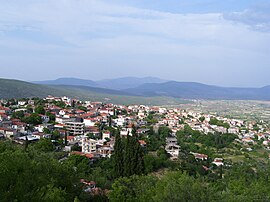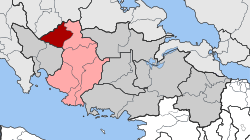
Summary
Davleia (Greek: Δαύλεια) is a village and a former municipality in Boeotia, Greece. Since the 2011 local government reform it is part of the municipality Livadeia, of which it is a municipal unit.[2] Its name comes from the ancient settlement Daulis. The municipal unit has an area of 94.985 km2, the community 61.725 km2.[3] The municipality includes the eastern portion of Mount Parnassos. Phthiotis lies to the north. Davleia is located ESE of Lamia, SW of Kamena Vourla, W of Livadeia and Thiva, NE of Itea and E of Delphi.
Davleia
Δαύλεια | |
|---|---|
 A view of Davleia | |
 Davleia Location within the regional unit  | |
| Coordinates: 38°31′N 22°44′E / 38.517°N 22.733°E | |
| Country | Greece |
| Administrative region | Central Greece |
| Regional unit | Boeotia |
| Municipality | Livadeia |
| Area | |
| • Municipal unit | 94.985 km2 (36.674 sq mi) |
| • Community | 61.725 km2 (23.832 sq mi) |
| Highest elevation | 410 m (1,350 ft) |
| Lowest elevation | 260 m (850 ft) |
| Population (2021)[1] | |
| • Municipal unit | 1,426 |
| • Municipal unit density | 15/km2 (39/sq mi) |
| • Community | 1,069 |
| • Community density | 17/km2 (45/sq mi) |
| Time zone | UTC+2 (EET) |
| • Summer (DST) | UTC+3 (EEST) |
| Postal code | 320 08 |
| Area code(s) | +30-2261 |
| Vehicle registration | ΒΙ |
| Website | davlia.com |
Modern population edit
| Year | Community | Municipal unit |
|---|---|---|
| 1981 | 2,264 | - |
| 1991 | 2,188 | - |
| 2001 | 1,764 | 2,397 |
| 2011[4] | 1,240 | 1,686 |
| 2021[1] | 1,069 | 1,426 |
History edit
Ancient edit
In ancient Greece, this city in Phocis was called Daulis (Δαυλίς) and at a later stage Daulia (Δαυλία) and Daulion (Δαύλιον). Mentioned by Homer, it was said to be named either in reference to the woody character of the area or after a nymph Daulis, a daughter of the river-god Cephissus.[5]
In Greek mythology, Daulis was the hometown of Tereus.
Daulis was the city at the end of the road not taken by Oedipus.[6]
During the Greco-Persian Wars, Daulis was destroyed for the first time in 480 BC. In 395 BC, the city was attacked by Thebes. In 346 BC, Daulis was destroyed again during the so-called Third Sacred War. In 220 BC, the city was attacked by the Aetolians. In 198 BC, the Romans occupied Daulis by a stratagem.
In Late Antiquity, Daulia was a seat of a bishop and is now a titular see of the Catholic Church.[7]
Remains of the walls of the city's acropolis can be seen today above the modern town.
Modern edit
The settlement is mentioned by Frankish documents of the last years of Latin rule in Central Greece as Daulia while a few years later, specifically in 1466, it is recorded in an Ottoman settlement as Tavla,[8] having a population of 150 families.[9] A few decades later (1506) another Ottoman census records 220 families in Davlia.[10]
The fighter of the Greek Revolution, Panagiotis Antonopoulos, was born in Davlia.[11] The inhabitants of Davlia took an active part in the revolution of 1821,[12] while the place became several times a field of conflict between the Greek revolutionaries and the Ottoman troops. In 1856, gunmen from Davlia took part in the operation to exterminate the gang of the robber Davelis.[13]
During the period of the National Divide , on January 29, 1918, a clash took place between a gendarmerie detachment and a force of local anti-Venezuelan armed forces consisting of Epistratos and soldiers who had lost their lives. Five Cretan gendarmes and an officer were killed during the battle. On February 12 of the same year, following a military court ruling, six people (two soldiers and four civilians) were executed at the scene of the conflict and found guilty of killing gendarmes.[14]
On 5 May 1943, the settlement was set on fire by a detachment of the Italian Occupation forces,[15] while on 21 October 1948, the DSE captain Pantelis Laskas (Pelopidas) was killed in an ambush by the National Guard and the gendarmerie. [16]
Sights edit
The fortifications of the ancient city and some other buildings are preserved in good condition. Sights of the area are the nunnery "Holy Monastery of Jerusalem" located a little north of Davlia and the ruins of the church of Agios Theodoros in the castle. Near Davlia, Greek mythology places the point where Oedipus , on his way to Delphi , killed his father Laius.
Sport edit
In the settlement is located the football club A.P.O. Pandavliakos, which was founded in 1936.
Transport edit
Road edit
National Road 3 passes near the village connecting it with Livadia, Lamia and other cities of mainland Greece.
Rail edit
The village is served by Davleia railway station, situated 8.3 kilometres (5.2 mi) north of the settlement on the Athens-Leianokladi railway with regional services to Athens and Leianokladi.[17]
See also edit
References edit
- ^ a b "Αποτελέσματα Απογραφής Πληθυσμού - Κατοικιών 2021, Μόνιμος Πληθυσμός κατά οικισμό" [Results of the 2021 Population - Housing Census, Permanent population by settlement] (in Greek). Hellenic Statistical Authority. 29 March 2024.
- ^ "ΦΕΚ B 1292/2010, Kallikratis reform municipalities" (in Greek). Government Gazette.
- ^ "Population & housing census 2001 (incl. area and average elevation)" (PDF) (in Greek). National Statistical Service of Greece. Archived from the original (PDF) on 2015-09-21.
- ^ 2011 Greek census: "Απογραφή Πληθυσμού - Κατοικιών 2011. ΜΟΝΙΜΟΣ Πληθυσμός". Hellenic Statistical Authority. (in Greek)
- ^ William Smith, Dictionary of Greek and Roman Geography (1854), entry: Daulis
- ^ Eisner, Robert (1987). The Road to Daulis: Psychoanalysis, Psychology, and Classical Mythology. Syracuse, NY: Syracuse University Press. ISBN 0-8156-0210-3.
- ^ Annuario Pontificio 2013 (Libreria Editrice Vaticana 2013 ISBN 978-88-209-9070-1), "Sedi titolari", p. 880
- ^ Kalaitzakis, Theofanis (2000). Eastern Central Greece from The late Frankish rule to the early Turkish occupation: Boeotia ca 1400-1500: political conditions, ecological and demographic development, economic life, social result. Athens: EKPA. Doctoral thesis. pp. 88-90.
- ^ Kalaitzakis, Theofanis (2000). p. 102.
- ^ Kalaitzakis, Theofanis (2000). p. 106.
- ^ World Curriculum Vitae . Educational Encyclopedia , Ekdotiki Athinon, 1999, volume one, p. 335.
- ^ Thymiou D. Dalka, 1993, pp. 50 - 51.
- ^ Konstantinou S. Antoniou, History of the Greek Royal Gendarmerie 1833 - 1967 , Book Exchange Publishing House, Athens 1965, volume AD, pp. 363 - 364.
- ^ George T. Mavrogordatos, 1915. The National Divide , Patakis publications, published, Athens 2016, pp. 298 - 301.
- ^ "Discover Viotia - Davlia".
- ^ Dionysis Charitopoulos, Aris the leader of the rioters , Greek Letters, Athens 2003, p. 778.
- ^ "OSE - 2017 Network Statement Annexes".
External links edit
- Local website


